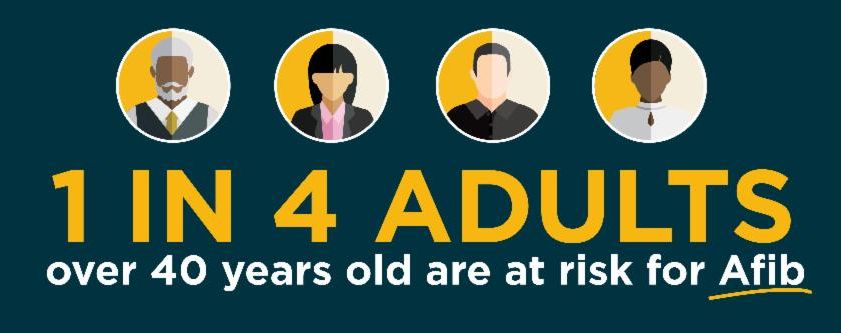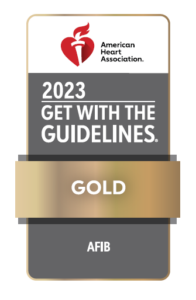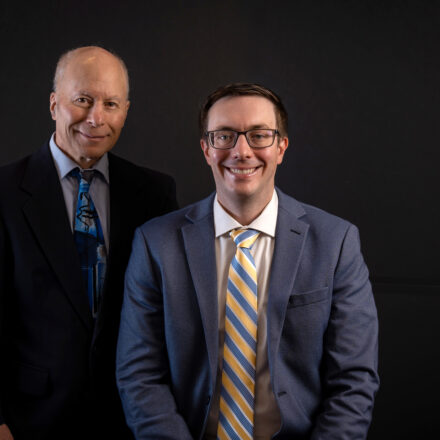
September is National AFib Awareness month — a time to raise awareness for this life-threatening condition. AFib, short for Atrial Fibrillation, is an irregular heartbeat or arrhythmia. Symptoms can include heart palpitations, shortness of breath and fatigue, however often there are no symptoms.
AFib is a serious condition that affects millions of Americans. One in four adults 40 and older will develop AFib in their lifetime, and not only can it increase the risk of developing heart failure, it can lead to blood clots and stroke — 15 to 20 percent of stroke patients have AFib. If left untreated, atrial fibrillation doubles the risk of heart-related death, increases the risk of stroke fivefold and significantly decreases the quality of life for most of those who suffer with Afib.
“It’s imperative that all atrial fibrillation patients have their stroke risk assessed and appropriately managed, as well as getting their heart rate under control,” said said Electrophysiologist, Ethan Levine, D.O., FHRS. Treatment options to restore a normal rhythm include medication, cardioversion and ablation. “The cardiac electrophysiology team at Monument Health works hard to ensure that they are leaders in providing the best possible care for cardiac arrhythmia patients and that the care provided meets or exceeds national guidelines for quality,” Dr. Levine added.
 The Get With The Guidelines – AFib quality achievement award is earned by hospitals that demonstrate a commitment to treating patients according to the most up-to-date research-based guidelines as outlined by the American Heart Association. Get With The Guidelines puts the expertise of the American Heart Association and American Stroke Association to work for hospitals nationwide, helping ensure patient care is aligned with the latest evidence- and research-based guidelines. Monument Health Rapid City Hospital recently received the American Heart Association’s Get With The Guidelines® – AFib GOLD quality achievement award for its commitment to managing AFib, ultimately helping to reduce patients’ stroke risk. In 2022, Rapid City Hospital was recognized with the Silver Award, the highest possible award an organization can receive in its first year participating.
The Get With The Guidelines – AFib quality achievement award is earned by hospitals that demonstrate a commitment to treating patients according to the most up-to-date research-based guidelines as outlined by the American Heart Association. Get With The Guidelines puts the expertise of the American Heart Association and American Stroke Association to work for hospitals nationwide, helping ensure patient care is aligned with the latest evidence- and research-based guidelines. Monument Health Rapid City Hospital recently received the American Heart Association’s Get With The Guidelines® – AFib GOLD quality achievement award for its commitment to managing AFib, ultimately helping to reduce patients’ stroke risk. In 2022, Rapid City Hospital was recognized with the Silver Award, the highest possible award an organization can receive in its first year participating.
Monument Health Heart and Vascular Institute physicians work hard to stay on the cutting edge. Last year, Monument Health Heart and Vascular Institute was the first health care system in South Dakota to use Octaray, an advanced high-density mapping catheter used for diagnosing complex arrhythmias in the heart, allowing for greater precision and greater success in treating AFib. They have also been the first in the region to use the new Optrell catheter and are among the first dozen hospitals in the country to use new Q dot ablation technology which allows for safer and more precise ablation of cardiac arrhythmias. Earlier this year, HVI completed its first patient procedure with an Abbott leadless pacemaker, a device implanted directly into the heart’s right lower chamber using a minimally invasive procedure, designed to be retrieved.
Since 2021, physicians at HVI have been treating persistent AFib with a procedure called convergent ablation in which a cardiothoracic surgeon uses a scope and precision surgical tools to reach the back wall of the left atrium and burn scar on short-circuiting heart tissue. Several weeks later, an electrophysiologist threads a catheter from the groin up to the heart and can address any remaining abnormal areas not accessible during the initial procedure.
“We started using this procedure two years ago, and we have really gone up in volume,” said Dr. Levine. “Our volume and experience with hybrid ablation procedures is greater than that of most hospitals in the country, including many university centers. It is great to be able to offer these options to our patients, and it makes a big difference in their quality of life. That’s very rewarding.”
Category
Blog PostsLatest News
More Like This

